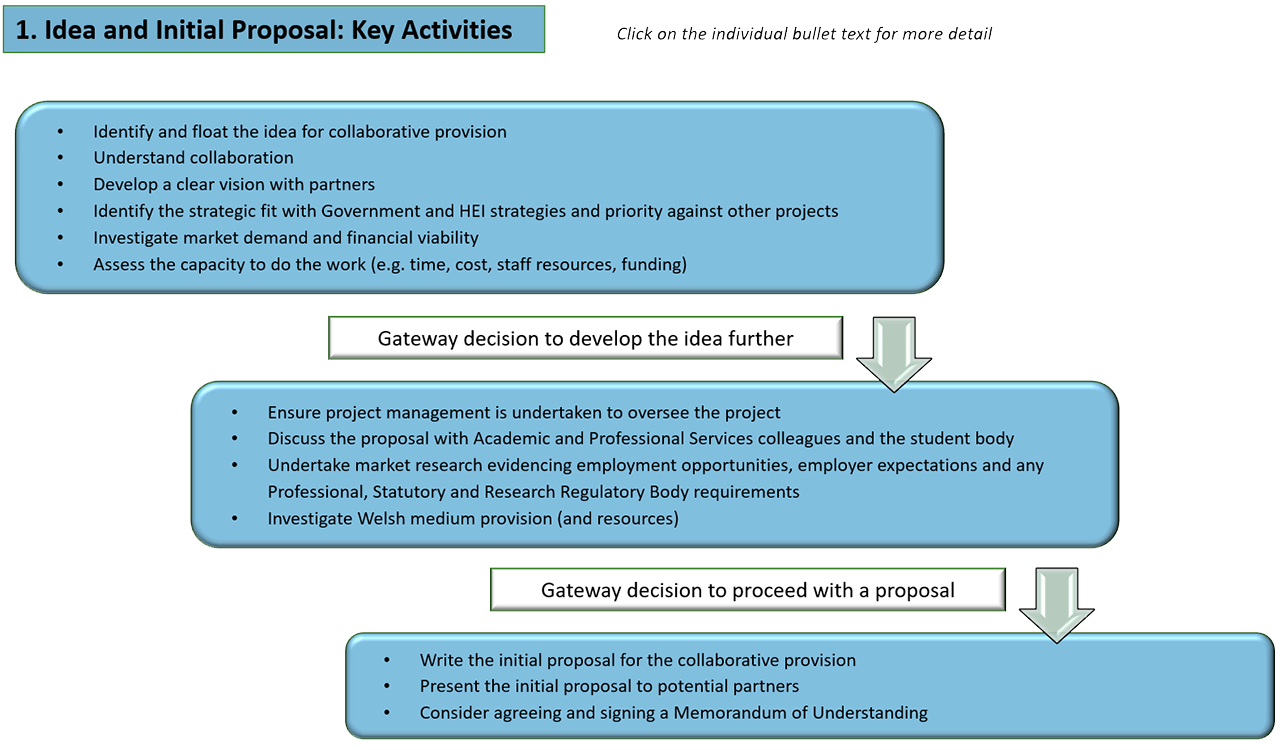29 April 2022
HEFCW HEIR: Collaborative Programmes Wales Project - Guidance Resource Pack

Author
John Bolton
Bangor University
The Collaborative Programmes Wales Project is supported by the HEFCW Higher Education Investment and Recovery (HEIR) Fund and guided by the Universities Wales Learning and Teaching Network (LTN).
Workstream 1 focused on barriers to successful collaboration and, supported by the Workstream Group, reviewed, and prioritised the risks, and developed a resource pack providing good practice guidance, example processes, types of activity and resources to support the development of collaborative provision.
The Guidance resource pack was developed by the Project Team, drawing on consultations with academic and professional services staff, the student body, lessons learned from previous collaborations, and desktop research.
The pack is designed to support anyone interested in exploring collaborative provision and can be used by HEIs in the development of their own quality assurance and enhancement resources. The pack is hosted by QAA Cymru, it will be promoted through the QAA Wales Quality Network, and is available to download from the QAA Website.
The Guidance presents an example process and key activities to provide an easy-to-understand framework for developing collaborative provision. It also provides practical resources which can be used to make collaboration easier.
The Guide uses an example four stage process diagram to navigate the detail.
- Idea and Initial Proposal
- Design and Development
- Partner Approval and Provision Validation
- Delivery, Operation and Management

Or delve deeper and investigate short descriptions of how to complete the activities and why. Links are provided to external information (for example, QAA advice and guidance) and additional resources can be downloaded, used, edited, and re-used.
For example:
- Benefits of collaborating can help to describe the idea and get buy-in from key stakeholders.
- The Responsibility Matrix (RACI) uses the process activities and identifies who should be involved, to ensure that aspects are considered at the right time by the right people.
- The Operational Checklist may be used by project leads, and institutional quality assurance team members, when developing and delivering the collaborative provision.
Risks to successful delivery and operation are identified in the Risk Log and, as with all institutions, the guidance advises monitoring of the student experience, continually improving standards and quality, establishing governance, and capturing lessons learned for future projects.
The process, activity discussed and the examples and resources, do not interpret or incorporate legislation, statutory or regulatory requirements, rather they are a tool for raising awareness of typical practices and demonstrate possible approaches. Colleagues must also refer to institutional processes for developing collaborative provision, which takes precedence.
How does the guidance help with quality enhancement?
The QAA defines ‘enhancement’ in the Quality Enhancement Review Handbook (2020) (paragraph 34), which encompasses continuous improvement and/or significant step-changes in policy and practice to improve the student learning experience. The resource pack is a tool for enhancing the understanding of current practice and a demonstration of possible approaches to developing collaborative provision. Furthermore, an example of a potential step change would be if this work increases collaboration in taught provision across the sector.
Opportunities and benefits of using the Guidance:
- The ‘roadmap’/journey with key activities provides a framework which is accessible to colleagues new to the collaboration/partnership process. Users can choose what level of detail they want to go into.
- The guidance and responsibility matrix (RACI) highlights important aspects to be considered by the right people at the right time, reducing potential problems and saving time.
- The Operational Checklist can be used to ensure that activities are not missed.
- The process and Checklist could easily be developed into a project plan to manage and control the development and delivery of new collaborative provision.
- Risks have been compiled from sector experience and lessons learned and are provided in the Risk Log. The risks can be edited, added to, deleted, filtered, scored, and mitigating actions can be implemented to improve the implementation of the project and likelihood of success.
- The resource pack brings together recent experience of developing and delivering collaborative provision across Wales and can be used alongside each higher education institutions’ own quality assurance and enhancement processes in this area.
Quality enhancement through collaboration:
For the academic:
- Connecting with others and sharing information provides new insights and increases knowledge.
- Achieve a common goal that cannot be achieved alone/greater achievement through working with others.
For the student:
- Improves the value of the students’ learning through access to greater expertise.
- High-quality collaborations with industry, the public and third sectors will enable students to gain valuable work experience, to think about their futures and encourage them to explore their entrepreneurial spirits.
For the institution:
- Enhances the curriculum and student learning opportunities.
For the sector:
- Greater access to a wider industry base across Wales with strong industry links offered by each HEI.
- Attractive to employers and employees (for example, skills, shape learning, building relationships).
- Positive impact on Welsh medium/bilingual provision.
Next steps
Download the Guidance Resource Pack from the QAA web site and use the information and resources in your next collaborative provision. Tell us how you are using the resources by emailing ARCAdmin@qaa.ac.uk.
The QAA Cymru team will monitor the visits to the web page and number of downloads. This information will help the Universities Wales Learning and Teaching Network to review and update the resource in future.
“This has been an interesting, challenging, and enjoyable project. The leadership has been great and the stakeholder engagement from across all the Welsh HEIs and external organisations has been fantastic, especially considering the problems colleagues have dealt with during the pandemic. The ways of working across the partnership is encouraging and the will to collaborate on this project and produce advice, guidance and lessons learned will be valuable for any new collaboration in the future.” John Bolton.
About the author: John Bolton is a senior project manager with a track record in leading and delivering business critical programmes and strategic projects in the Higher Education sector.
